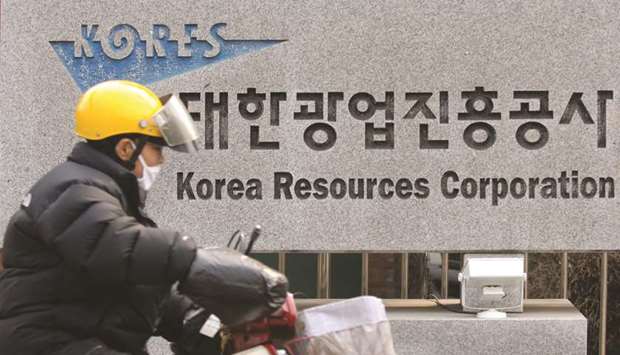The energy and resources firm has hired five arrangers for US dollar-denominated notes to repay $500mn of debt that will mature in May, a person familiar with the matter said last week. South Korea’s parliament rejected a bill late last year to boost the company’s capital, after its 3.7tn won ($3.5bn) of outstanding debt neared a legal limit, and bond investors are watching the government’s next move.
Korea Resources, which was established in 1967 to supply commodities to the nation’s burgeoning corporate sector, has been hit by large losses in recent years due to depressed commodities prices and troubles at its key mines.
Any signs that the government is pulling support could fuel concern about the status of other state-owned firms, potentially leading to rapid credit-rating downgrades for a sector that’s still a major employer in Korea, according to Shinhan Investment Corp. “I would view this bond sale as a positive to the credit as I believe it signifies unchanged government support, at least for a few more years,” in that the government wouldn’t allow the firm to issue debt if it was considering pulling support, said Anthony Leung, the Hong Kong-based director of Asia-Pacific credit research at Wells Fargo & Co.
“Issuing new dollar debt is basically just kicking the can down the road for any major changes.” Korea Resources, based in Wonju in Korea’s northeast, will meet investors next month and a global bond offering may follow in April, subject to market conditions, the person familiar said.
While the yield premium on the firm’s 2018 note rose to 148 basis points over Treasuries last month, the highest since 2014, it has come down to 135. Its credit rating was cut to A from A+ in November by S&P Global Ratings, which said it expects the firm’s debt to remain high.
But the rating company also gave it a stable outlook, on expectations of continued government support “because it serves an essential policy role to secure overseas mineral resources for economic development in Korea.”
There’s a “very low” possibility of any defaults on its borrowings given that the government will want to avoid hurting the creditworthiness of other state-owned enterprises, said Kim Sang-hun, credit analyst at Shinhan Investment in Seoul.
Bond sales by Korean SOEs offshore came to about $20.2bn in 2017, more than half of the total from the country, Bloomberg-compiled data show. Korea Resources is preparing internally for the reintroduction of the funding bill this year, its spokesperson said.
An official at Ministry of Trade, Industry and Energy said nothing has been decided over the company. The ministry said in a January 4 statement that it will form a task force dealing with overseas resource development and restructuring.
As bond investors await the task force outcome, Korea Resources may need to win them over with measures including a “comfort letter” from the government that attests to its support for the company, according to Lim Jungmin, credit analyst at NH Investment & Securities Co in Seoul.
“The government will likely reassure investors to let Korea Resources sell the notes” by showing investors continued support for the firm, said Shinhan Investment’s Kim.
That may include plans for a bill to allow the company to increase debt, or help with restructuring efforts, he said.

